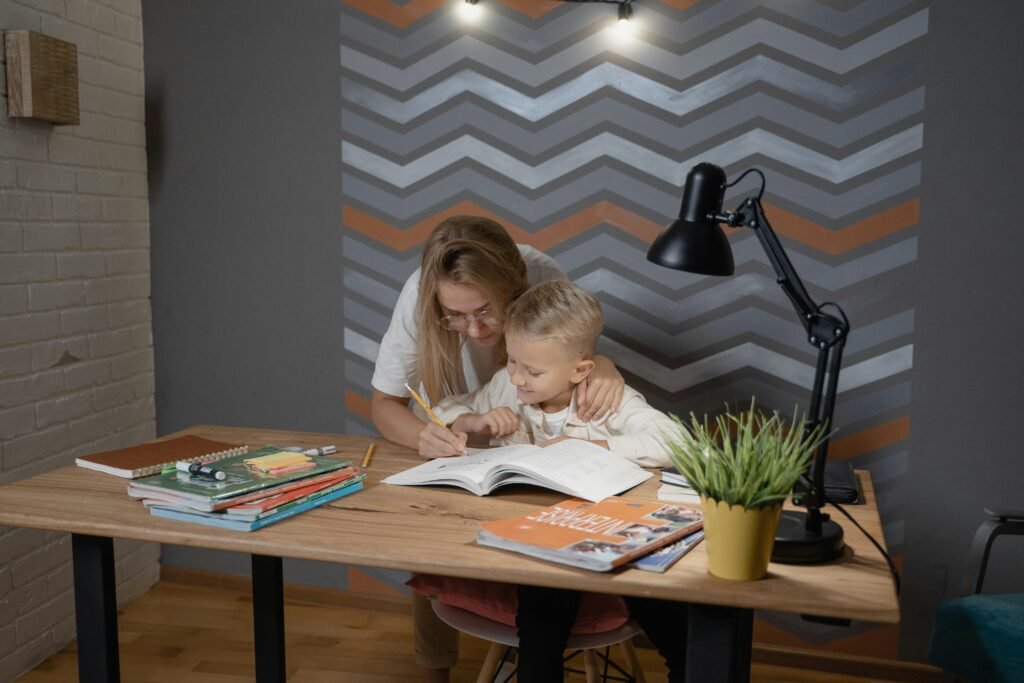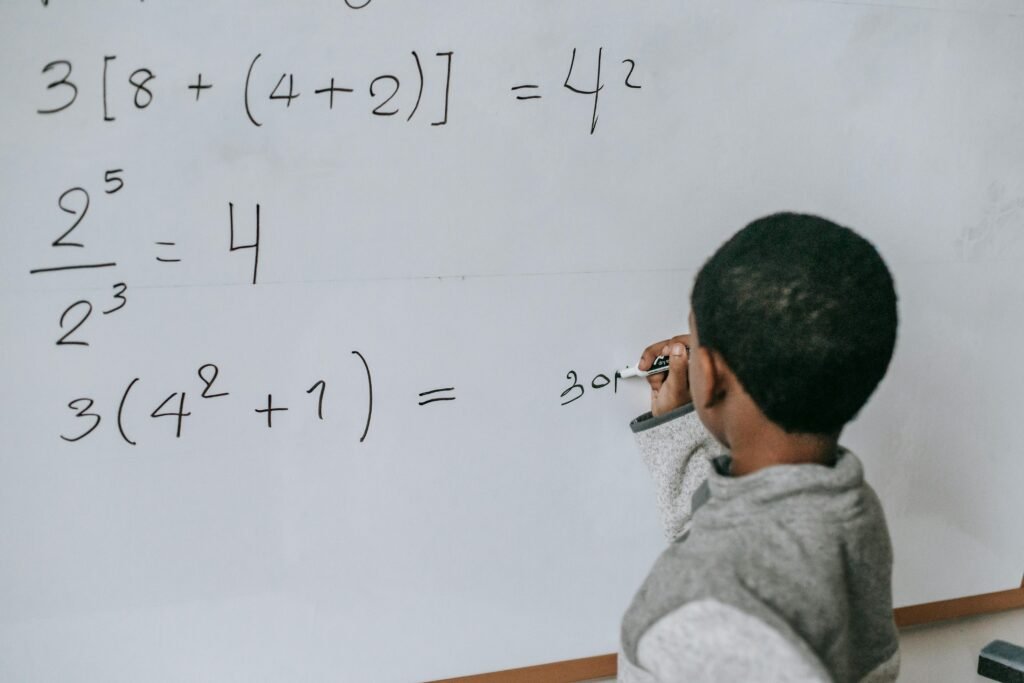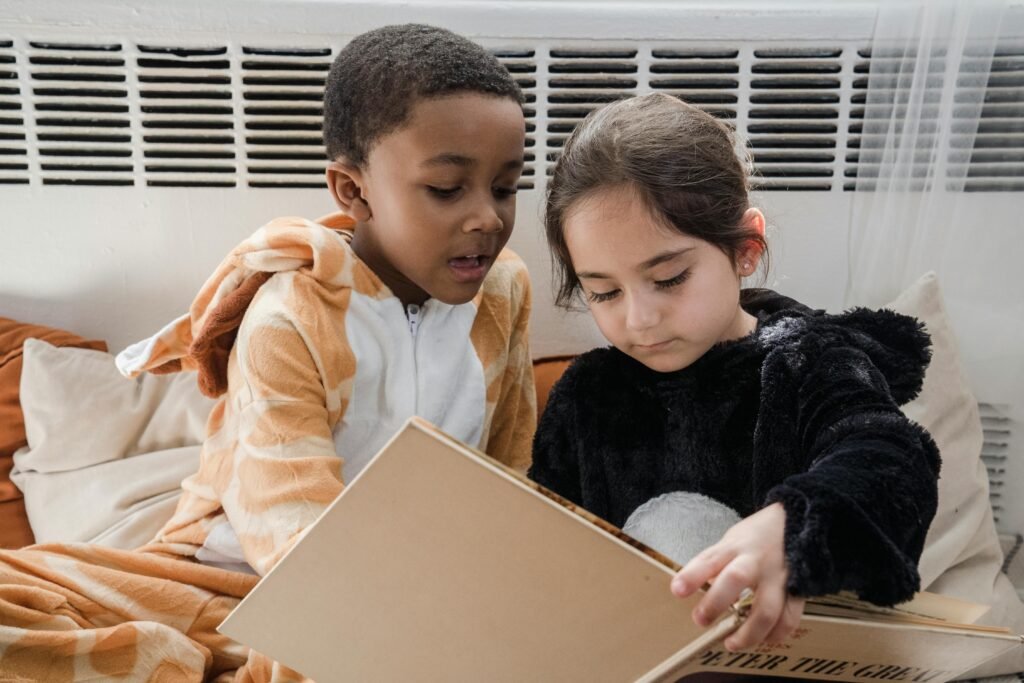From the moment a baby is born, their brain begins growing at a speed that’s hard to imagine. Those early years—from birth to five—are full of wonder. They’re also a time when little ones are learning how to talk, think, and connect with the world. Language is a big part of that. The words a child hears, the back-and-forth talk with parents, the silly songs, the bedtime stories—they all help shape how a child’s brain develops.
Children aged 0–2 years learn best through human interaction—not screens
In the first two years of life, a child’s brain is like a sponge. Every hug, smile, song, and word you share with your baby builds their brain. But here’s something important: screens can’t do this job the same way a human can.
Human interaction means real-time talking, facial expressions, touch, and eye contact. When you smile, your baby smiles back. When you sing, they coo or clap. This kind of give-and-take is called “serve and return.” It’s the way babies learn to speak and understand language. They’re not just hearing words—they’re feeling them. They see your mouth move, your eyes light up, and they begin to copy you.
Now, when a baby is placed in front of a screen—whether it’s a phone, tablet, or TV—that rich interaction is missing. Even if the content is colorful and includes songs or talking animals, the baby isn’t truly engaging. They’re just watching. And watching isn’t the same as learning.
So what can parents do?
Talk to your baby during everyday moments. While changing diapers, describe what you’re doing. During bath time, sing a silly song. Make funny faces. Point to things and name them. All of this helps your child build the base for speaking and understanding.
It doesn’t take fancy toys or apps. Your voice is more powerful than any screen.
Screens might seem like a good way to keep babies quiet or entertained, but they can’t replace your presence. Keep screen time as close to zero as possible for kids under 2. Instead, fill their world with your words and love.
Every word you say now builds the brain they’ll use forever.
Infants under 18 months should avoid screen time altogether, except for video chatting (AAP)
The American Academy of Pediatrics is very clear: babies under 18 months should not have screen time. The only exception is video calls with loved ones. Why is this the case?
At this age, babies are learning who they are. They learn through touch, smell, sound, and movement. Screens don’t give them these things. Even the best educational app cannot give a baby the warmth of your voice or the feeling of being held.
Video chatting is different because it’s real. It lets grandparents or faraway friends smile, sing, and talk to your baby live. It’s not perfect, but it’s better because it involves real human connection.
Many parents use screens to calm their baby while cooking or resting. It’s understandable. Life gets busy. But every minute of screen time in these early months takes away from valuable human contact. Even playing on the floor while you talk to your baby from across the room is better than screen time.
So what can you do instead?
Let your baby explore safe objects like soft books, colorful blocks, or rattles. Put on some music and dance with them. Read the same short book over and over. Repetition helps babies learn.
If you need a break, place your baby in a safe area with a few toys, and let them watch you from nearby. Talk to them while you cook or fold laundry.
Screens are everywhere, but you can choose to wait. These early months are short, but the impact lasts a lifetime.
Excessive screen time before age 2 is linked to delayed language development
Language development begins long before a child says their first word. It starts with babbling, cooing, looking at faces, and watching lips move. These tiny steps add up. But when screen time gets too high, those steps slow down.
Research shows that toddlers who spend too much time in front of screens often speak later. They might say fewer words or have trouble forming sentences. This is because screens don’t give them the same language-rich experience that real people do.
Think about it: a child watching a cartoon might hear a hundred words. But they aren’t talking back. No one is waiting for their response. There’s no pause, no eye contact, no smiles just for them. In contrast, a 5-minute conversation with a parent can include hundreds of meaningful words, questions, and facial expressions.
Too much screen time also replaces important activities like reading books, pretend play, or chatting during meals. These moments are full of the words and feelings children need to build strong language.
So what’s a better approach?
Keep screen time to a minimum. For children under 2, aim for almost none. If you do allow screens, make sure you’re there with them, talking about what you’re watching together.
Most importantly, look for everyday chances to talk. When putting on shoes, name the colors. At snack time, describe the food. Ask questions, even if your child can’t answer yet. Language grows from these tiny seeds.
The more your child hears real words from real people, the better their language will grow.
Every additional 30 minutes of screen time is associated with a 49% increased risk of expressive speech delay in toddlers (2017 study)
This is a number that surprises many parents. Just 30 extra minutes of screen time can nearly double a child’s risk of speech delay. That means fewer words spoken, more frustration, and slower progress in learning to talk.
This stat comes from a study done in 2017. It looked at thousands of toddlers and found a clear pattern. As screen time went up, spoken words went down. Children who had more screen time each day were much more likely to have trouble expressing themselves.
This doesn’t mean screens cause all speech problems. But they play a big role—especially when they replace talking time.
Let’s look at what expressive speech delay looks like. A child might be able to understand what you say but struggles to speak. They may use fewer words than expected for their age. They might point or grunt instead of talking. They may get upset because they can’t express their needs.
So what can you do?
Start by keeping screen time limited. Stick to under 30 minutes a day for toddlers, and always be present during viewing. Talk about what you’re seeing. Ask questions. Pause and wait for your child’s reaction.
Then, fill the rest of the day with chances to talk. Narrate what you’re doing. Repeat simple phrases. Respond with excitement when your child babbles or points. Every little sound matters.
If you’re concerned about speech delays, talk to your pediatrician or a speech therapist. Early help can make a big difference.
Remember, your voice is the most powerful tool your child has. Use it every day.
Toddlers aged 16–24 months who used mobile devices had lower scores in vocabulary and grammar
Between 16 and 24 months, children go through a major language boom. This is the age when they start saying two-word phrases like “want milk” or “go park.” They begin to learn grammar without even knowing it—just by listening and copying.
But here’s what researchers found: toddlers who spent more time using mobile devices during this age scored lower in vocabulary and grammar. They knew fewer words. They struggled more with stringing words together.
Why does this happen?
When kids are using a phone or tablet, they’re often doing it alone. They’re watching or tapping, but not talking. They’re not hearing the back-and-forth rhythm of conversation. And when there’s no back-and-forth, there’s no language practice.
Even so-called “interactive” apps don’t help much. Most don’t respond to what a child says or adjust to their learning needs. A child can tap a screen all day but still not understand how to use new words in real life.
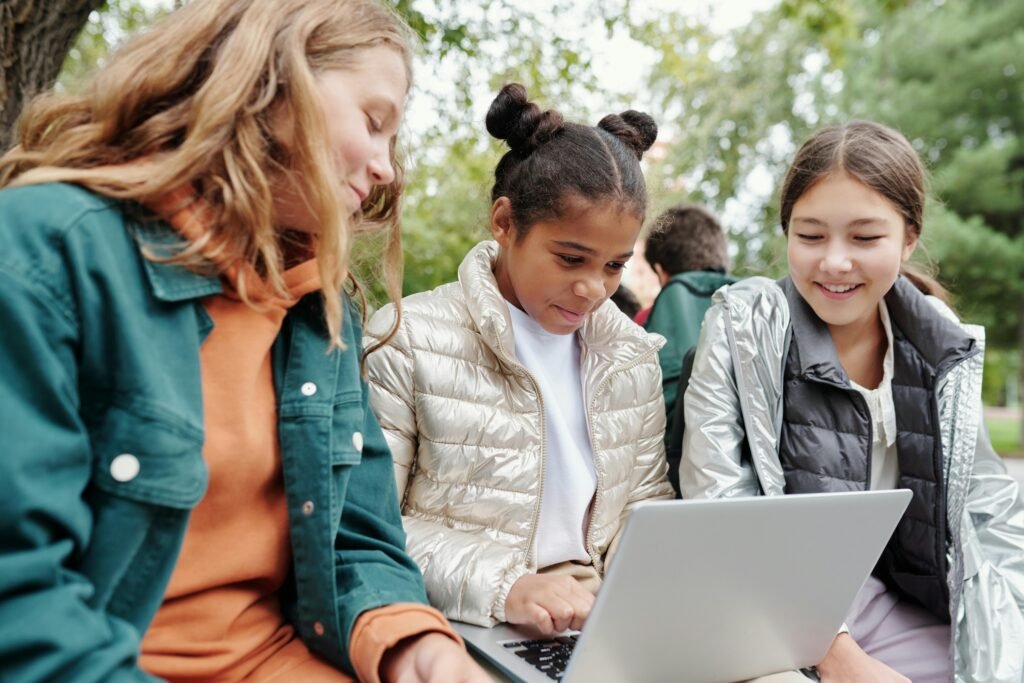
The good news is that the brain is still growing fast at this stage. You can support your toddler by creating a language-rich home.
Put away the tablet and read picture books together. Ask your toddler to point to things on the page. Let them finish your sentences. When they say something, repeat it and add a new word. If they say “dog,” you say, “Yes! That’s a brown dog!”
Even things like singing songs, playing peekaboo, and naming body parts during diaper changes are powerful learning tools.
Every small moment counts. Your toddler learns more from five minutes of playing with you than an hour alone with a screen.
Children exposed to more than 2 hours of screen time a day before age 3 had lower communication skills at age 3
This stat is especially important because it shows how screen habits in the early years shape a child’s future. If a child spends more than 2 hours a day on screens before age 3, their communication skills may be weaker by the time they turn 3.
That means they may have a harder time speaking clearly, using full sentences, or understanding what others say. These aren’t just academic skills. These are life skills. The ability to ask for help, explain a feeling, or follow a story—all start here.
Why does this happen?
When screens take up hours of a child’s day, they take time away from play, conversation, and reading. Screens don’t slow down or wait for a child to answer. They don’t ask questions based on what the child said. And they don’t offer emotional support like a parent’s voice or touch can.
To help your child develop strong communication skills, keep screen time low and focus on real-life talk.
Talk about everything. If you’re walking outside, name what you see. If you’re cooking, describe the smells and actions. If your child points to something, name it, and add more details.
It’s also helpful to have screen-free times during the day—like meals and bedtime. This gives more chances for conversation and bonding.
When screens are used, make them social. Sit with your child. Pause and talk about what’s happening. Ask what they think. Make the screen time part of your relationship, not a replacement for it.
Language grows best in warm, loving, human moments. Those moments can’t be downloaded.
Background TV reduces the number of words spoken by both parents and toddlers by up to 70%
This one is sneaky. You might think that just having the TV on in the background isn’t a big deal. Maybe no one is really watching. But here’s what studies show: even when the TV is just background noise, it changes how much we talk—and not in a good way.
When the TV is on, parents talk less. Children talk less. And the quality of conversation drops a lot. Some researchers found that background TV can reduce the number of words spoken between parent and child by as much as 70%. That’s huge.
Why does this happen?
The brain can only focus on so many things at once. When the TV is on, it pulls our attention—even when we think we’re ignoring it. We pause more. We say less. We miss chances to respond to what our child is doing.
Kids pick up on this. They may get quiet. They may stop trying to talk or show things. Over time, that silence adds up.
The fix is simple: turn off the TV when no one is watching it. Make the space quieter. Make room for your child’s voice.
Try having a “TV off” rule during meals, playtime, and bedtime routines. You’ll be amazed how much more your child starts talking when there’s nothing in the background competing for attention.
And it’s not just about quantity—it’s about quality. With no background noise, your child can hear your voice clearly. They can see your face. They can connect and feel safe, and that’s where real language grows.
Babies learn fewer words when watching educational videos than when interacting with caregivers
Many parents buy baby videos that promise to teach colors, numbers, or even foreign languages. But the truth is, babies don’t learn language from screens the same way they do from people. In fact, they learn fewer words from watching these “educational” videos than from simple, everyday interaction with caregivers.
One study showed that for every hour a baby watched a learning video, they actually knew fewer words than babies who didn’t. Why? Because the key to learning language isn’t just hearing words. It’s interacting with someone who speaks directly to the child.
When a parent talks to a baby, they use a special kind of speech—slower, higher-pitched, full of emotion. They pause, wait, repeat, and respond. This helps the baby make connections between sounds and meaning.
Screens don’t do that. Even if the video includes a smiling face or catchy song, it doesn’t adjust to your baby. It doesn’t pause when your baby looks away. It doesn’t answer your baby’s babble with a smile or hug.
The best “educational tool” your baby has is you.
Instead of turning on a video, try singing nursery rhymes, pointing to pictures in a book, or playing peekaboo. Your baby learns more from five minutes of this kind of play than from any screen.
The simple truth is this: babies don’t need screens to get smart. They need people. They need words spoken with love, faces full of emotion, and hands that tickle and hold.
Parent-child conversation during shared media use is critical to positive learning outcomes
Let’s face it—screens are part of our world now. And yes, sometimes they can be fun and even educational. But here’s the catch: the learning only really happens when a parent or caregiver is involved.
When a child watches something with a parent who talks to them, asks questions, and explains what’s going on, the child learns more. A lot more. That’s because the brain is built to learn through interaction.
Shared media use means sitting together, watching the screen together, and turning it into a conversation. It’s not about handing over a tablet and walking away. It’s about being present and turning screen time into learning time.
For example, if your child is watching a show about animals, you can say, “Look at the elephant! What sound does an elephant make?” Or if the character on the screen is sad, you can ask, “Why do you think he’s sad? What could help him feel better?”
These little questions and comments help children connect what they see to what they know. They also make the experience more social and less passive.
So how can you do it?
If your child watches a video or plays an app, sit with them. Comment on what you see. Repeat new words. Point out emotions. Make silly voices. Pause often to let them respond.
Don’t worry about saying the “perfect” thing. Just talk. Your voice is what matters.
And keep in mind: the more often you do this, the more your child will expect it. They’ll start pointing things out to you. They’ll ask questions. That’s when you know real learning is happening.
Screens don’t have to be the enemy. But they work best when used together—with love, laughter, and language.
Kids aged 8 to 16 months learned six to eight fewer words for every hour of baby DVDs watched daily
This stat comes from a major study that surprised a lot of parents. It found that babies between 8 and 16 months who watched baby DVDs actually knew fewer words—not more. For every hour they watched, they knew six to eight fewer words.
That’s a big deal, especially in a stage when language is just starting to bloom.
It’s easy to think that if something is labeled “educational,” it must be helpful. But many of these DVDs aren’t designed based on how babies really learn. They’re often filled with flashy images, background music, and random words—but no real interaction.
The baby may be looking at the screen, but they’re not learning the way they do from real people. They’re not hearing words that are linked to what they’re looking at. They’re not getting repetition in context. And they’re not getting that all-important emotional connection.
So what can parents do instead?
Swap the baby DVD for a board book. Choose one with bright pictures and simple words. Sit with your baby, point to each picture, and name it. Make animal sounds. Repeat key words. Smile. Wait for their reaction.
If you’re busy, just talk about what you’re doing. “Now we’re putting on your socks! Look—blue socks!” It may not feel like teaching, but to your baby, it’s the best kind of school.
The fewer DVDs, the more words your baby will actually learn.
And remember—no video, no matter how cute, can take your place. You’re the best teacher your baby will ever have.
Screen exposure in infants under 1 is linked to poorer attention and self-regulation skills later on
When babies under 12 months are exposed to screens, it doesn’t just affect their language. It can also change how their brain handles focus and emotions later on.
This is because a baby’s brain is still wiring itself. The way they learn to pay attention, calm down, and shift from one thing to another all comes from real-world experiences. Screens, with their fast changes, bright lights, and loud sounds, can overwhelm a baby’s developing system.
As a result, children who spend a lot of time with screens early on may have more trouble paying attention later. They may get frustrated more easily. They may not be able to play alone or wait their turn.
That’s because screens often offer instant rewards—flashing lights, quick answers, fast results. But real life doesn’t work that way. Real learning takes patience. It takes trying, failing, and trying again.
So what’s the better path?
Create a calm, quiet space for your baby to explore. Give them simple toys they can touch, chew, shake, or bang. Let them lie on a blanket and watch the light move across the ceiling. Give them space to feel bored sometimes—yes, boredom is a gift.
Talk to them. Make eye contact. Hold them when they cry. These small things teach your baby how to handle their feelings and focus their mind.
Screen time isn’t just about what your baby sees—it’s about what they miss. And when they miss out on real interaction, their inner world doesn’t grow the way it should.
So give them the gift of presence. Your calm, loving attention now builds the skills they’ll use for life.
Children exposed to screens before 12 months are at higher risk for expressive language delays
The first year is all about connection. Babies learn how to speak by listening, watching, and trying out sounds with people they trust. When screens become part of their day too early, that back-and-forth learning is lost.
Studies have shown that babies who are exposed to screens before they turn one are at greater risk for expressive language delays. That means they may understand what you say, but have trouble saying words themselves.
Why does this happen?
Because expressing language is a complex skill. It takes more than just hearing words. It takes real interaction. Babies need to practice making sounds, copying your lips, and learning the rhythm of conversation. A screen can’t offer that.
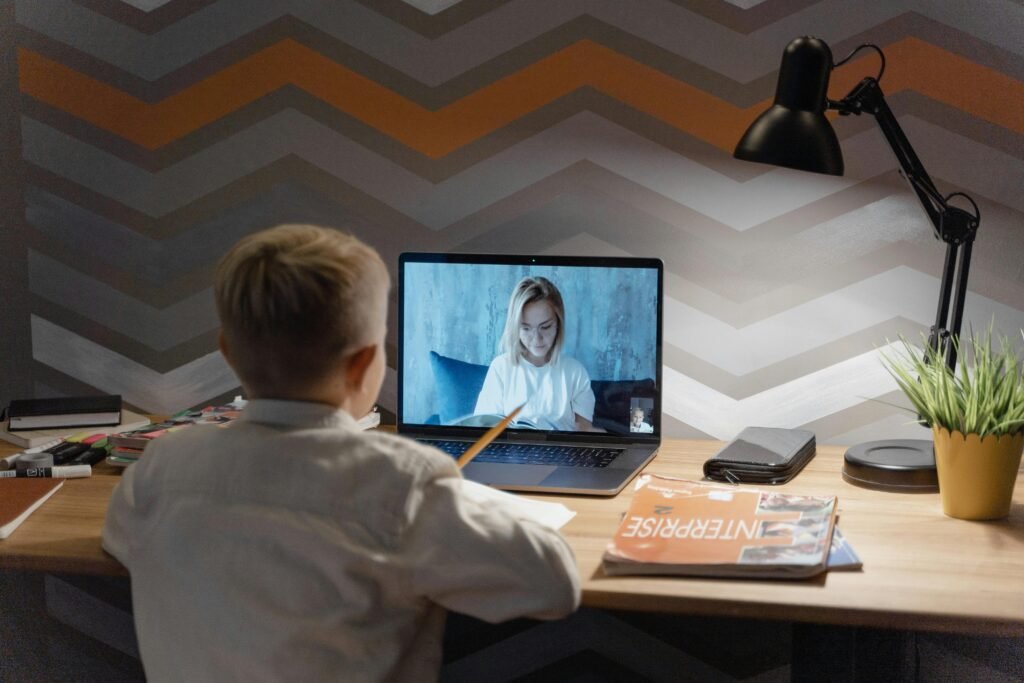
Think of it like this: your baby is learning to be part of a conversation. If they’re watching a screen, they’re just a listener—not a speaker.
To help your child avoid delays, focus on face-to-face time. Turn off screens during key parts of the day—feeding, diapering, cuddles, and bedtime. Use those moments to talk, sing, and connect.
When your baby babbles, babble back. When they make eye contact, respond with a smile. These small interactions are the building blocks of speech.
You don’t need fancy tools or special apps. You just need your voice, your face, and your time.
Interactive reading with caregivers helps double the number of words children hear each day
Reading to your child is powerful. But what’s even more powerful is interactive reading. That means not just reading the words, but stopping to talk, point, ask questions, and respond to your child’s reactions.
When you read this way, you’re not just sharing a book. You’re having a conversation. And research shows that this kind of reading can double the number of words a child hears each day.
That’s huge—especially during the early years, when hearing more words leads to stronger language, thinking, and school success later on.
So what does interactive reading look like?
Let’s say you’re reading a book about animals. Instead of just saying, “This is a lion,” you can say, “Look at the lion! What sound does a lion make?” Or “Can you find the baby lion?”
Even if your child is too young to answer, they’re learning. They’re hearing more words. They’re seeing how conversation works.
If your child points at a picture, follow their interest. Talk about it more. Ask questions. Use big and small words. Let them turn the pages and choose the books they love.
Make reading a daily habit, even if it’s just 5 minutes. You don’t have to finish the book. It’s about connection, not completion.
Interactive reading builds vocabulary, memory, and emotional bonds. It also teaches patience, focus, and curiosity. All from something as simple as a story.
And remember—no screen can match the magic of your voice reading a story that you both love.
Toddlers with less than 30 minutes of screen time per day show stronger language growth
Here’s a bright spot in all the research: limiting screen time to under 30 minutes a day during the toddler years has been linked to stronger language development.
That means more words spoken, clearer sentences, better understanding. And more confidence when talking to others.
It’s not just about avoiding harm. It’s about giving your child more time for the right kind of learning—talking, playing, exploring, and bonding.
So how can you put this into action?
Set simple screen limits. Try saving screen time for the late afternoon, when your child needs to wind down. Choose shows with real people, gentle pacing, and lots of language. Sit with them. Talk during and after the show.
Then fill the rest of the day with language-rich activities. Sing songs while brushing teeth. Talk about what’s in the fridge. Pretend play with stuffed animals.
Even running errands can be a learning moment. At the store, name colors and objects. Ask your child to help you find items. At the park, talk about the trees, sky, and birds.
Less screen time means more space for learning. It gives your child the chance to build skills that no screen can teach.
And don’t worry about being perfect. It’s not about zero screen time—it’s about more talking time.
That’s what helps your toddler’s words take flight.
90% of brain development happens before age 5—making language-rich interaction critical
This is one of the most powerful facts in early childhood: by the time your child turns 5, their brain is already 90% developed.
That’s why what happens in these early years matters so much. It’s a window of time when your child is building the foundation for everything—how they think, feel, learn, and relate to others.
And at the center of all this growth is language.
Language helps your child ask questions, solve problems, tell stories, and make friends. It helps them understand the world and express their own ideas. Without strong language skills, learning becomes harder. So the earlier you start building those skills, the better.
The good news? You don’t need to do anything fancy. You just need to talk, listen, and respond.
Play with your child. Sing songs. Name body parts. Use rich words and simple words. Repeat them often. Describe what you’re doing, what your child is doing, and what’s happening around you.
Every word you say is like a building block for your child’s brain. And the more language they hear in a loving, connected way, the stronger that brain becomes.
Screens can’t do that job. They can entertain, yes—but they can’t build a brain like you can.
So talk to your baby, toddler, and preschooler—early and often. It’s the most important investment you’ll ever make.
Children under 2 learn best in real-time social interactions—not from screens
When a child is under 2 years old, their brain is wired for real-time, real-life learning. That means they learn best from people—not videos, not cartoons, not even the most “interactive” app.
This is because real-time interaction is full of tiny moments that screens can’t offer. Eye contact. Facial expressions. Tone of voice. Waiting for a response. Smiling back. Touching, pointing, giggling.
These things are what help a child’s brain grow strong.
When your child says “ba,” and you say, “Do you mean ball?”—you’ve just taught a word, and also taught them how conversation works. That can’t happen through a screen.
In fact, even shows that are made for babies often move too fast. They don’t pause. They don’t respond to your child’s cues. And they don’t adapt to what your child is interested in.
That’s why the learning that happens in real life is so much deeper.
To help your child thrive, focus on time with people—not pixels.
Play peekaboo. Stack blocks together. Blow bubbles and name what you see. Copy your baby’s sounds. Let them see your face, hear your laugh, and feel your joy.
These moments don’t just teach words—they teach connection.
And that’s something no screen can ever replace.
For every hour of screen time, infants and toddlers hear 770 fewer words from adults
Let this number sink in: 770 fewer words for every hour of screen time.
That’s not just a small drop—it’s a massive missed opportunity. Every word a child doesn’t hear is a word they’re not learning. And when these gaps happen every day, they quickly add up.
Why does this happen?
Because when the screen is on, adults talk less. It’s almost automatic. We get quiet. We focus on the screen—or let it fill the silence. Even if we don’t mean to, our voices slow down. Conversations stop.
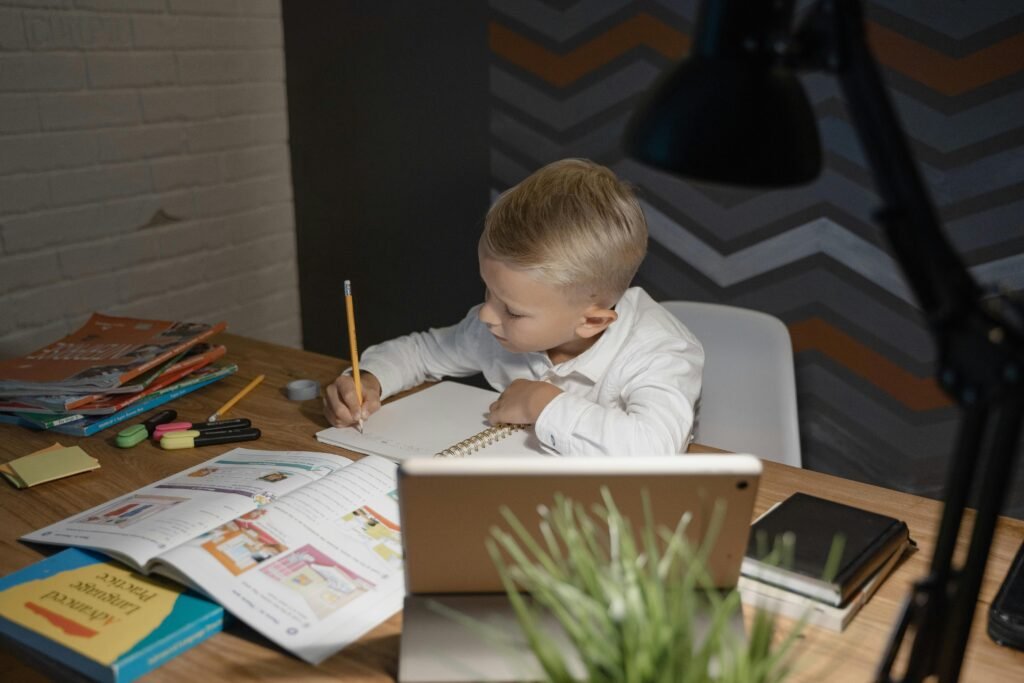
Infants and toddlers rely on those words. It’s how they build language. It’s how they understand the world. Without a steady flow of spoken words, their language development slows down.
But the good news is this: you have full control over this. Every time you choose to turn off the screen and turn toward your child, you’re filling their world with words again.
So what’s the takeaway?
Keep screen time short and focused. Use it with intention, not as background noise. Create “word-rich” moments throughout the day—during meals, diaper changes, car rides, and bedtime.
Narrate what you’re doing. Ask silly questions. Repeat your child’s sounds and words. Count the steps as you climb. Describe the weather outside. Point to things and name them.
Every extra word your child hears from you is a gift. And every moment away from a screen is a chance to connect more deeply.
Preschoolers who watch more than 1 hour of TV per day have lower verbal IQ scores
Preschool is a time when your child is soaking up everything—language, numbers, emotions, and how the world works. But too much screen time during this stage can hold them back.
Research has shown that preschoolers who watch more than an hour of TV daily tend to have lower verbal IQ scores. That means they struggle more with understanding and using language—both in speaking and listening.
Why does this happen?
Because screens often replace the things that actually grow verbal skills: storytelling, pretend play, conversation, and reading. These activities help kids learn new words, how to use them in sentences, and how to express ideas clearly.
TV also often moves fast. It doesn’t wait. It doesn’t give your child a chance to practice talking. It just flows, and the child becomes a passive watcher.
So what’s the better option?
Cap screen time to less than an hour a day. Choose high-quality shows with lots of language and slower pacing. But even better—fill your child’s day with play, talk, and books.
Pretend to be animals together. Tell stories about your day. Make up silly rhymes. Read a favorite book and ask your child to guess what happens next.
These simple, joyful moments build your child’s verbal brain. And that leads to better thinking, better learning, and better communication skills later on.
High screen time during early years is linked to less parent-child conversation time
Parent-child conversation is one of the most powerful tools in early development. Every time you chat with your child, you’re building their brain. You’re helping them learn how to express themselves, how to listen, and how to solve problems.
But when screen time goes up, these conversations go down. It’s not just about what’s on the screen—it’s about what’s not happening because of it.
When a child is watching a show or playing on a tablet, the natural back-and-forth of conversation is missing. Even if a parent is nearby, the interaction often stops. The child isn’t asking questions, and the parent isn’t responding.
Over time, this leads to fewer chances for learning language, building memory, and understanding emotions.
The solution? Make room for conversation.
Turn off screens during key parts of the day—mealtime, bath time, car rides, and bedtime. These are golden moments for talking.
Ask your child open-ended questions. “What was your favorite part of the day?” “Why do you think that happened?” Even if your child’s answers are short or silly, they’re practicing important skills.
You don’t need a lot of time. Even 5–10 minutes of focused talk a few times a day can make a big difference.
Your voice, your questions, and your love matter more than any screen ever could.
Children under 5 who engage in daily shared book reading show better vocabulary and comprehension
Reading books with your child isn’t just a sweet bedtime tradition. It’s one of the most powerful things you can do to boost their language and thinking.
Kids under 5 who are read to daily have better vocabularies, stronger comprehension, and a greater love for learning. They’re better at understanding stories, asking questions, and using new words in conversation.
And here’s the best part—you don’t need to be a perfect reader. Your child doesn’t care if you stumble over a word or skip a page. What they care about is your voice, your warmth, and the time you’re spending with them.
So how can you make shared reading even better?
Choose books with clear pictures, simple text, and stories that match your child’s interests. Read slowly. Point to the pictures. Ask questions like “What do you think will happen next?” or “How do you think she feels?”
Repeat favorite books often. Children learn through repetition. The more they hear a word, the more likely they are to use it.
And don’t worry if your child interrupts or wants to talk during the story. That’s a good thing! It means they’re engaged and thinking.
Try to make reading part of your daily rhythm—after breakfast, before nap, or as part of the bedtime routine.
Every book is a chance to grow your child’s brain. Every story is a seed for imagination. And every minute spent reading is a moment of magic—just between you and your child.
Digital media use in young children correlates with reduced sleep, impacting learning and communication
Sleep is one of the most important things for a young child’s brain. During sleep, the brain organizes what it has learned, stores new memories, and gets ready for the next day. But when screen use goes up, sleep quality often goes down—and that hurts both learning and communication.
Why does this happen?
Screens give off a type of light called blue light, which tells the brain to stay awake. If your child watches a screen close to bedtime, their body may not produce enough melatonin, the hormone that helps them fall asleep. Even if they do fall asleep, the sleep might not be deep or restful.
Lack of sleep affects mood, focus, and the ability to learn new words. A tired child may not want to talk, may forget things more easily, and may struggle to connect with others.
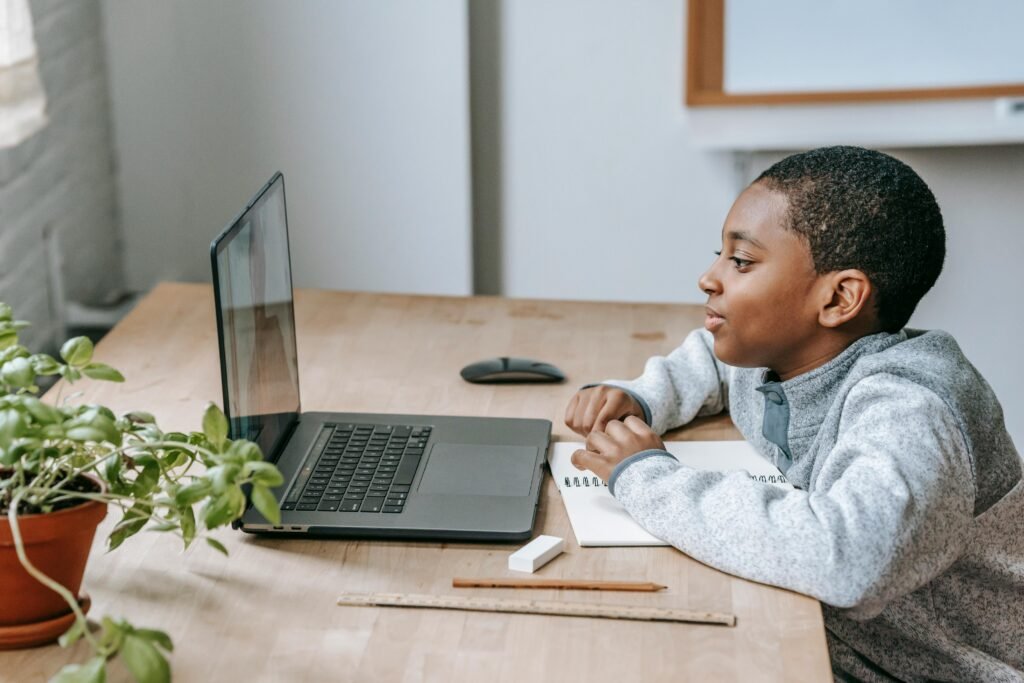
So how can you help?
First, make the hour before bedtime screen-free. Instead of a show or app, switch to a quiet activity: reading a book, talking about the day, or singing lullabies.
Second, set a regular bedtime routine. Kids thrive on structure. A warm bath, cozy pajamas, and a calming story can signal to the brain that it’s time to wind down.
Third, move screen time earlier in the day. If your child watches something educational, do it in the morning or early afternoon—never right before bed.
Better sleep means a happier, more focused, more verbal child. And all it takes is swapping screen time for some quiet connection.
Parents speak 95% fewer words to toddlers during screen use compared to non-screen play
Here’s a surprising fact: when toddlers are using screens—even just watching a show—parents speak 95% fewer words to them than when they’re playing together without screens.
That’s not a small drop—it’s a near-complete shutdown of parent talk.
And remember, it’s not just the words themselves that matter—it’s the tone, emotion, rhythm, and back-and-forth of a real conversation. When those go away, so does a huge part of your child’s language learning.
Why do we go quiet when screens are on? Because our attention is pulled in. The show takes over the room. The screen becomes the center of focus.
But toddlers need you to be the center of their world—especially when they’re learning to talk.
So what’s the takeaway?
Whenever possible, choose shared play over screen play. Play blocks. Do puzzles. Make funny faces. These moments are full of rich, natural conversation.
If screen time does happen, make it interactive. Sit together. Talk about what you see. Pause the video and ask questions.
And remember, the more words your toddler hears from you, the more they’ll use on their own. Every “What’s that?” and “Can you find the dog?” helps build their confidence and vocabulary.
Less screen = more words = smarter, happier kids.
Screen time displaces crucial activities like storytelling, singing, and pretend play
There are certain things that help kids grow in powerful ways—things like storytelling, singing, and pretend play. These aren’t just fun extras. They are key tools for building imagination, language, empathy, and memory.
But when screens take up hours of the day, these magical activities get pushed out.
Think about it: if a child spends two hours watching videos, that’s two hours less for puppet shows, building forts, or making up stories with their toys. And these are the exact moments that help children understand how the world works—and how to express themselves in it.
So what can you do?
Build screen-free pockets in the day that are just for creative time. Sit down and make up a silly story together. Let your child be the superhero, the animal, or the teacher. Don’t worry about “doing it right.” Just follow their lead and let them talk.
Sing together while cleaning up or getting dressed. Make up your own songs. Use rhymes and rhythms to keep it fun.
You can even start a nightly tradition where your child tells you a story. It doesn’t need to make sense—it just needs to come from them.
These moments of creativity build more than language. They build confidence, focus, imagination, and social skills.
Screens don’t have to be the enemy. But if they take the place of these rich experiences, they cost more than we realize.
Kids who watch TV alone don’t learn as well as those watching with an adult who discusses the content
It’s not just what your child watches—it’s how they watch.
When a child watches TV alone, they may enjoy the show. But they miss out on the kind of learning that comes from shared viewing—watching with an adult who pauses, talks, explains, and asks questions.
Research shows that kids who watch with an adult who interacts with them during the show actually learn more words, understand the content better, and are more likely to talk about what they saw later.
Why? Because learning happens best in relationships. When a parent watches with a child, they can connect what’s on the screen to the child’s real life.
For example, if a character is counting apples, you can say, “Let’s count apples too! One, two, three!” Or if a character is sad, you can ask, “Why do you think she feels that way?”
Even simple comments like “Wow, that’s a big truck!” or “He’s jumping so high!” help build vocabulary and interest.
So if your child is watching a show, make it count. Sit with them. Talk about what you’re seeing. Ask what they think. Let the screen become a chance for bonding, not just babysitting.
Because when learning is shared, it’s stronger, deeper, and more fun—for both of you.
Two-year-olds need around 12,000 to 15,000 words heard per day for healthy language growth
This number might sound big—but it’s exactly what growing brains need. On average, two-year-olds need to hear 12,000 to 15,000 words per day to build strong language skills. That doesn’t mean they have to say all those words—it means they need to hear them.
Every “Let’s get your shoes” or “Time to eat your yummy banana” adds up. Every story, every chat, every silly song—all of it counts.
Now imagine what happens if most of the day is spent in front of a screen. Even if the content has some talking, it’s not directed at your child. It’s not personal. And it’s usually not back-and-forth.
That’s the big difference. Kids don’t just need words. They need conversation—the kind that involves eye contact, response, emotion, and care.
So how can you reach that word goal?
Narrate your day out loud. Talk about what you’re doing, what your child is doing, and what’s happening around you. Read books. Tell stories. Ask questions. Repeat their words and add new ones. Keep it simple and loving.
Don’t count the words—just be present. When you engage with your child with warmth and words, those 15,000 words happen naturally.
Screens can’t provide this level of personal talk. Only you can.
Children with more than 2 hours of screen time at age 1 have lower communication scores at age 2
This stat should be a wake-up call for all of us: just two hours of daily screen time at age 1 is linked to lower communication skills just one year later.
That means kids may speak fewer words, use simpler sentences, or struggle to express ideas. These communication gaps can affect how children interact with others, follow instructions, and feel confident in group settings like preschool.
Why does it happen so fast?
Because the brain is in hyper-growth mode in that first year. It’s forming over a million neural connections every second. It’s learning how sounds become words, and how words become feelings and actions.
When screen time crowds out conversation, play, and face-to-face bonding, the brain misses out on those rich learning moments.
Here’s what you can do instead.
For babies, keep screens almost completely off. Fill the day with smiles, songs, words, and cuddles. Let your child hear your voice all day long.

For toddlers, stick to short, shared screen sessions with meaningful interaction. And always talk about what you see on the screen, just like you would talk about a storybook.
The first years shape your child’s voice, thinking, and heart. Keep screens in their place—and make room for the magic of real connection.
Passive screen use does not build vocabulary the way active, back-and-forth talk does
There’s a big difference between hearing words and using words. Just because a child is watching a show with lots of talking doesn’t mean they’re learning vocabulary.
In fact, passive screen time—where your child is just watching or listening—has little effect on building the vocabulary they need. What truly builds language is active, back-and-forth talk.
That’s where your child hears a word, tries to use it, hears a response, and learns how to use it better. It’s like playing verbal catch: you throw a word, they throw one back, and over time they get better and better.
Screens don’t throw the ball back. Even the best apps rarely adjust to your child’s unique learning rhythm.
So instead of hoping a screen teaches new words, create a space where conversation thrives.
Repeat words often. Use them in different contexts. “That’s a big ball! Look at the big chair! Can you say big?” Let your child try, fail, and try again.
And when they use a new word, celebrate! Say, “You said dinosaur! That’s such a big word!”
The more your child hears and uses language in real life, the more confident and skilled they’ll become. And that can only happen in the beautiful back-and-forth of human talk.
Infants need eye contact, facial expressions, and gestures to develop language—and screens can’t replace that
A baby’s first “classroom” isn’t a screen—it’s your face.
From the moment they’re born, babies are watching you. They study your eyes, your smile, your raised eyebrows, your hand movements. This is how they learn the rhythm of speech, the meaning behind sounds, and the feeling behind words.
When you smile and say, “Hi baby!” your baby sees your mouth move, hears the tone of your voice, and feels your love. That’s what starts to wire their brain for language.
Screens can’t give this. They don’t offer eye contact. They don’t smile at your baby. They don’t respond when your baby coos or laughs.
That’s why face-to-face time is non-negotiable. Babies need it to grow language, emotion, and connection.
So give your baby lots of time with your face—no matter how silly you feel.
Stick out your tongue. Raise your eyebrows. Say “boo!” and laugh together. Point to your nose and say “nose!” Let your baby copy you. This playful interaction is more valuable than any app or video.
Remember, your baby isn’t just watching—they’re learning. And you’re the best teacher they’ll ever have.
Children exposed to screens during mealtime hear up to 50% fewer words from parents
Mealtime is a hidden gem for language learning. It’s one of the few times when families naturally sit down, face each other, and have a chance to talk.
But when a screen is on during meals—whether it’s the TV, a phone, or a tablet—children miss out on up to half the words they would normally hear.
That’s 50% less conversation. 50% fewer questions. 50% fewer chances to learn new words like “crunchy,” “juicy,” or “hot.”
More than that, screen-filled meals often feel rushed and disconnected. Kids eat faster. Parents talk less. The sense of togetherness fades.
But mealtime can be so much more.
Turn off the screen. Sit face to face. Ask your child about their day. Talk about the food. Say, “This carrot is so crunchy! Can you crunch too?” or “Mmm, this soup is warm—just like a blanket.”
Even babies can be part of the conversation. Talk to them while feeding. Make eye contact. Smile. Repeat words like “bite,” “more,” “yummy.”
These moments don’t just feed the body—they feed the mind and heart.
Excessive screen exposure in early years is associated with language delays, emotional problems, and reduced cognitive development
This final stat brings everything together.
Too much screen time in the early years doesn’t just affect speech—it touches every part of a child’s growth: language, emotion, thinking, focus, and even relationships.
Children with high screen exposure are more likely to have:
- Trouble understanding or using language
- Difficulty managing emotions
- Shorter attention spans
- Slower problem-solving skills
- Weaker memory
- Fewer social skills
Why? Because they’re missing the real-life experiences that build these skills.
Screens move fast. They don’t ask for patience. They don’t require empathy. They don’t offer problem-solving. They don’t make eye contact or give hugs.

But life does.
So what’s the solution?
Limit screen time. Focus on connection. Build a home full of words, stories, songs, and love. Talk often. Read daily. Play freely. Laugh loudly.
Your child’s brain is ready to grow—right here, right now. And with your help, it can grow in the most beautiful, brilliant way.
Conclusion:
In these early years, every moment matters. Every word spoken, every story told, every silly song sung—it’s all shaping the person your child is becoming.
Screens aren’t evil, but they can’t replace you. Your voice. Your eyes. Your love. These are the most powerful tools your child will ever have.
Use them boldly. Use them daily.
